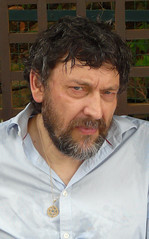MIDDLEBURGH
To inform entertain and excite my kids, Jamie, Patrick, Aaron & Sarah Middleburgh, our family and friends.
about me Dave Middleburgh
Dave Middleburgh
powered by BLOGGER
To inform entertain and excite my kids, Jamie, Patrick, Aaron & Sarah Middleburgh, our family and friends.
about me Dave Middleburgh
Dave Middleburgh
powered by BLOGGER

While Hilliary, Barrack and Johnny have been slugging it out , China has been electing deputies to the (next) 11th National People’s Congress (China's parliament).
On the one hand we have a traditional western style adversarial system i.e.
and on the other, a culturally different system which seeks national consensus where
You can argue that this model either allows "the best of the best to rise the top" or"it's open to manipulation and good old fashioned cronyism" In reality it depends on how the candidates get preselected, nominated and how the voting system works at each level of the election.
In HK 50 candidates have just stood for election to 36 NPC "seats"(a ratio of 9/5 candidates/seats). It was rumored (and denied) that veteran NPC members and cadres, amongst the 90 potential contenders, were dissuaded from standing. Apparently (if Wikipedia is to be believed) the ratio of candidates to available seats elsewhere in china is normally limited to 110/100 (national level); 120/100(provincial level) and 120-150/100 (local level). When Gordon Brown was in Beijing a couple of weeks ago, the BBC aired an interview with a dissident under house arrest, who bitterly complained that Chinese elections were not free and fair ... he asserted that if there were 5 seats to fill, the Party would select 5 candidates for voters to choose from. An outrageous proposition, but perhaps not that far from the truth.
HK candidates had to be resident, aged over 18, and a Chinese Citizen (lets me out!!). They also had to get a minimum of 10 nominations from members of the HK Electoral Conference. This body is the Electoral College which in 2007, elected the HK Chief Executive, expanded from 800 to 1,231 people. It was made up of "worthies" from functional and other sectors of the community and it votes on behalf of Hong Kong masses who themselves had no direct vote.(they were however consulted this year about panda names)Electoral college member could not nominate or vote for more than 36 candidates.
It's worth noting that the majority of HK voters have rejected the Electoral College system for CE elections on the basis that it is not truly representative. Not surprisingly immediately after the NPC vote there were calls to similarly allow for voting of future NPC deputies by universal suffrage.

Electoral colleges may or may not be representative but more importantly it is much more difficult to subvert, suborn, coerce or influence a significant number of an electorate of 3.0 Million registered voters. Ronny Tong Ka-wah Civic Party legislator (pan-democrat) and Former Bar Association chairman , in a recent SCMP article pointed out that since he became a legislator his law practice had declined significantly because potential clients who had business dealings on the Mainland were reluctant to work with him in case it caused them problems there. You have to wonder how many of the 1000+ Electoral College members could find themselves in a similar situation.
The Electoral College organized 17 forum meetings to allow candidates to pitch to members but apparently they only invited the 40 "most serious" contenders. (i.e. 40 candidates/36 seats which is closer to the ratios indicated in Wikipedia and complained of by the dissident) The pan Democratic candidates cried foul since they were only invited to 4 of the forums. 15 candidates got more than 200 nominations each. The highest number received by any of the 4 Pan-democratic candidates was 27 and as I understand it, essentially the 40 candidates with highest number of nominations were invited.
Where I come from, there is no cap on the number of election candidates, and if you are duly nominated, the system ensures that you get a guaranteed minimum time on TV/radio no matter how fringe your politics are, so whilst I understand the rationale that a candidate who gets few nominations in a closed electorate is unlikely to do well in vote from that same electorate and therefore may merit less "consideration", I personally am not comfortable with the approach of not giving that candidate minimum access to the electorate. If you want to reduce the number of candidates being considered surely it is simpler to increase the qualifying criteria/number of nominations needed to stand - or is that too unsubtle?? The most obvious reason why you might want to reduce number of candidates anyway apart from making the process more manageable (a lame excuse if ever) would be to
HK is a multicandidate "constituency" and each Electoral College member had to vote in candidates for all seats, or none. I.e. if a member wanted to vote for the 4 pan-democratic candidates only, he was forced to vote for 32 other candidates some of whom might hold positions to which objected. The Pan-Democrats complained about this, but if everyone could vote for less than 36 candidates, it would be possible that some of the 36 seats could be unfilled. Their complaint is not really different to that where in a three way vote using first past post system 65% of electorate can oppose winning candidate. In the event there was some tactical voting to exclude some hard-core Beijing "yes" men. However of the 25 candidate who restood for reelection only 2 lost their seats. All 4 pan democrats were defeated and 13 new delegates were elected (details listed below)
On February 16, the 36 HK deputies, and 142 HK delegates from the Chinese People's Political Consultative Conference, will be having a "get to know you" bash in Zhouhai. The CPPCC (not to be confused with the NPC) is effectively China's second but non elected chamber, to which 2,237 people have also just been appointed. It is a consultative organization made up of more "worthies" invited by the Communist Party and represents a broad spectrum of society.
No doubt the HK delegates in Zhouhai will be discussing their voting strategies for maximizing HK influence over central government policies and how to get HK members onto their respective Standing Committees. Rita Fan who got highest number of votes in NPC "election" may replace the current HK deputy (who did not stand for reelection). There has even been talk about getting 2 Standing Committee members - Macau currently has 2 but only has total of 12 deputies as opposed to HK's 36. Actually HK deputies are already privileged anyway since they and the Macau delegations are under the direct supervision of the National Standing Committee.
And there may be further discussion about whether HK NPC/CPPCC members should have their own office and a web site in HK. Apparently this is considered politically sensitive in the context of 1 country 2 systems since it may be considered to be a setting up a competing centre of political power to Legco which will be having elections later this year.
It's perhaps worth mentioning that in the November HK District Council elections, as expected, pro Beijing parties recovered from their disastrous showing in the previous 2003 DC elections. They took this as "proof" that HK voters were not as interested in universal suffrage as claimed by pan-democrats. The reality is perhaps simpler: pro-Beijing parties can mobilize at local level more effectively than the pan-democrats, which means that, if they are not shooting themselves in the foot by trying to introduce deeply unpopular Article 23 Legislation, they will always do better
Two weeks later there was a LegcoBy-election for the Hong Kong Island constituency where Regina Ip (she of the failed Article 23 legislation) went head to head with Anson Chan (ex colonial Chief Secretary) in a 1 person 1 vote first past post poll, (i.e. a western style election) worthy of Hillary and Barack. Either the pendulum effect had kicked in, and HK voters compensated for voting the other way in the DC elections, or this vote was the real "referendum" on universal suffrage. Regina Ip's supporters have claimed a moral victory in that they had broken the HK Island 60% barrier for the first time, but the bottom line is ... she lost.
We all look forward to the upcoming Legco Elections this year.... (See here for more)
| Name | Votes | Age | LC/EC* | New |
| Rita Fan Hsu Lai-tai | 1118 | 62 | LC | |
| Laura Cha Shih May-leung | 1108 | 58 | EC | Y |
| Ma Fung-kwok | 1092 | 52 | ||
| Maria Tam Wai-chu | 1088 | 62 | ||
| Ian Fok Chun-wan | 1087 | 58 | Y | |
| Wang Rudeng | 1079 | 65 | ||
| Ng Ching-fai | 1073 | 68 | ||
| Wilfred Wong Ying-wai | 1069 | 55 | ||
| Bernard Chan | 1062 | 43 | LC/EC | Y |
| Cheng Yiu-chung | 1062 | 59 | EC | |
| Yeung Yui-chung | 1061 | 56 | ||
| Joseph Lee Chung-tak | 1060 | 56 | ||
| Fei Fih | 1051 | 65 | ||
| Leung Ping-chung | 1049 | 66 | ||
| Ng Leung-sing | 1047 | 58 | ||
| Ip Kwok-him | 1037 | 56 | ||
| Peter Wong Man-kong | 1036 | 59 | ||
| Dennis Lam Shun-chiu | 1028 | 48 | Y | |
| Wen Ka-shuen | 1028 | 54 | ||
| Fanny Law Fan Chiu-fun | 1027 | 54 | Y | |
| Martin Liao Chung-kong | 1022 | 50 | Y | |
| Sophie Leung Lau Yau-fun | 1022 | 62 | LC | |
| Yuen No | 1003 | 66 | ||
| Lau Pui-king | 978 | 62 | ||
| Miriam Lau Kin-yee | 965 | 60 | LC | Y |
| Wong Yuk-shan | 959 | 58 | Y | |
| Lo Suk-ching | 953 | 57 | ||
| Lo Sui On | 920 | 57 | ||
| Tso Wung-wai | 918 | 66 | ||
| Ko Po-ling | 889 | 59 | ||
| Choy So-yuk | 876 | 57 | LC | Y |
| Michael Tien Puk-sun | 867 | 57 | Y | |
| Wong Kwok-kin | 867 | 55 | ||
| Raymond Ho chung-tai | 832 | 68 | LC | |
| Ma Ho-fai | 827 | 56 | Y | |
| Tim Lui Tim-leung | 821 | 53 | Y |
* LC/EC Legco Member or Exco menber
|
